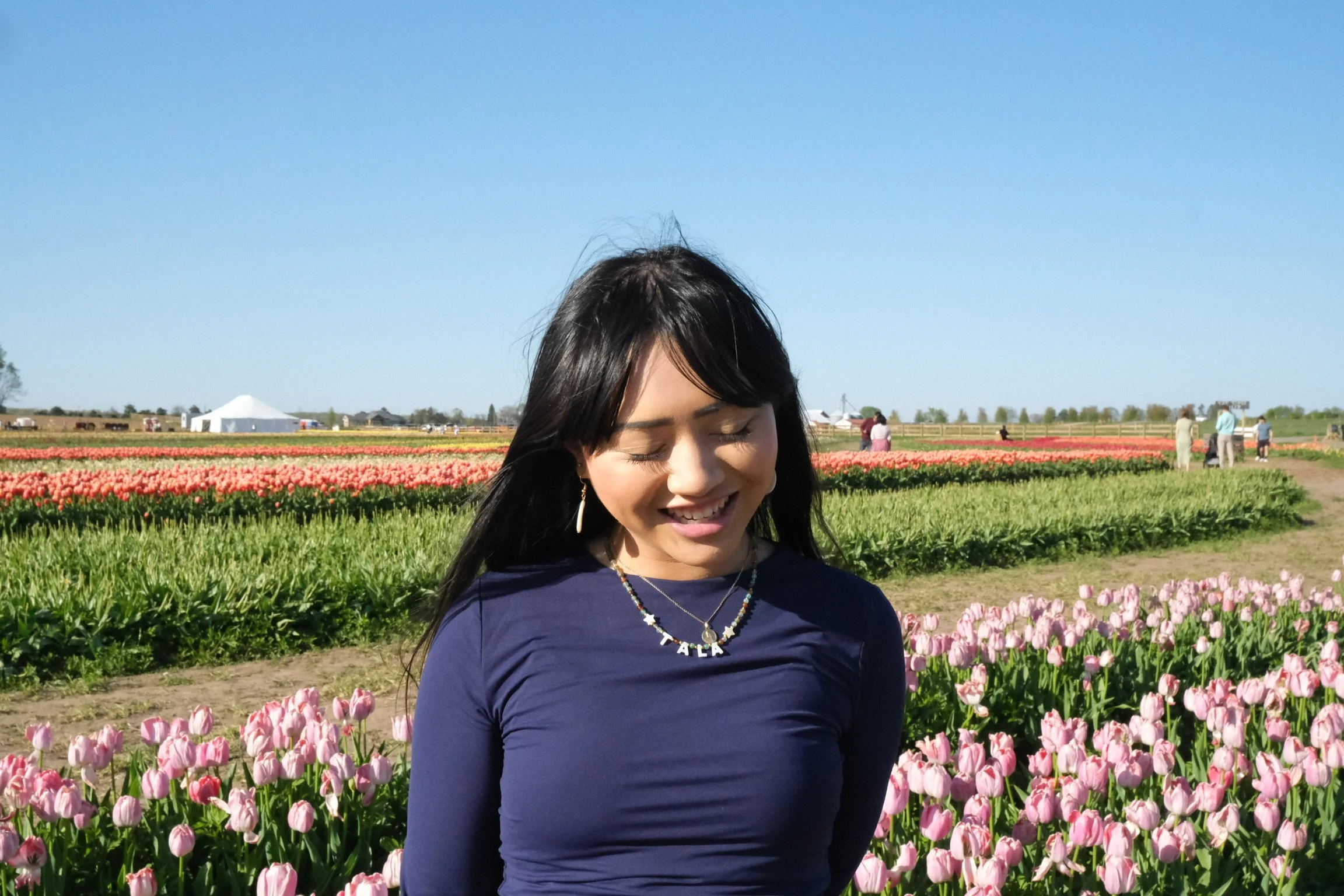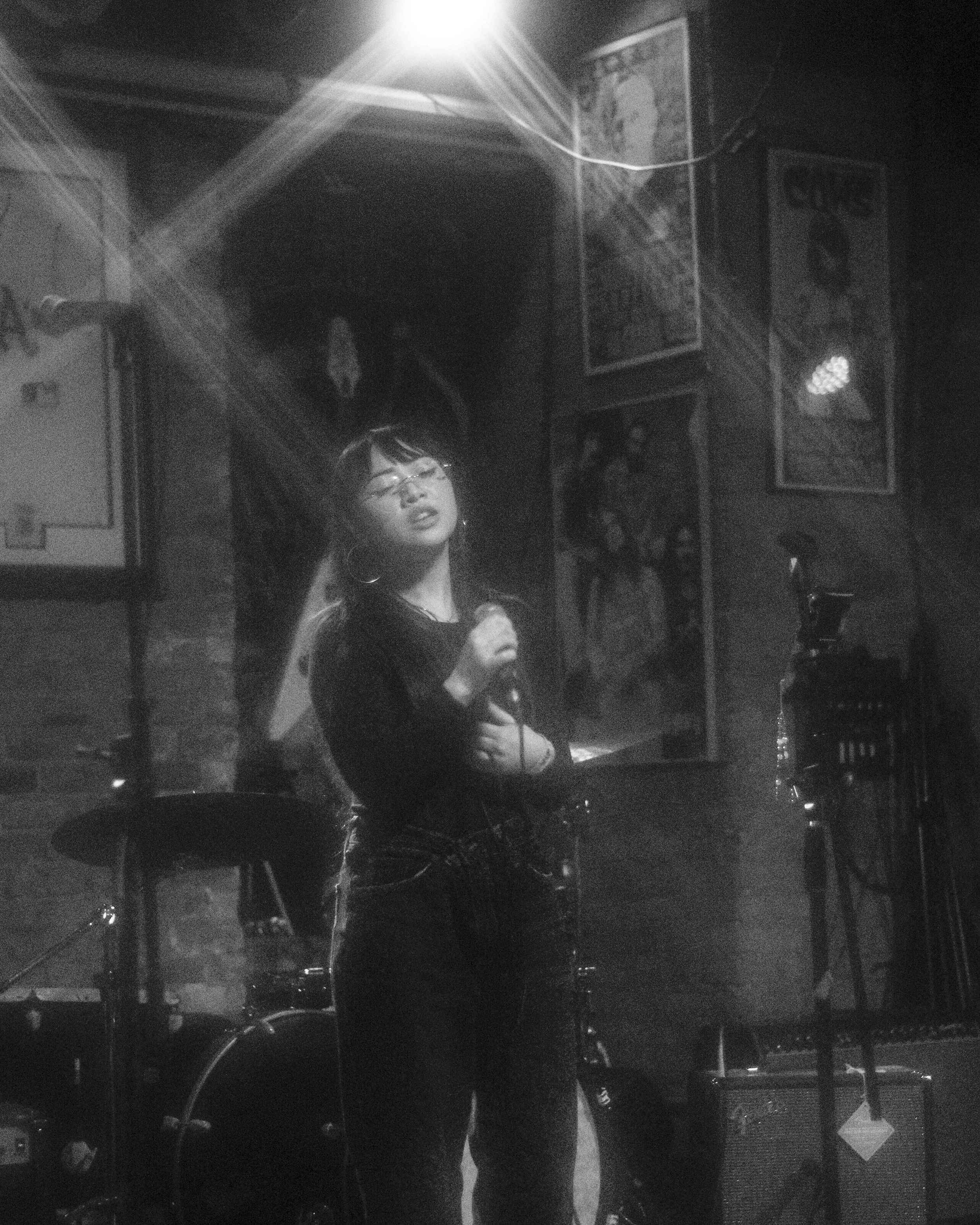Q&A: Tala Silva Captures What it Feels Like to Not Have it All Figured Out
INTERVIEW
INTERVIEW
☆ BY SHEVON GREENE ☆
TALA SILVA DESCRIBES HER MUSIC AS A LATE-NIGHT DRIVE — with the windows down, freestyle melodies flowing, soft harmonies drifting in, and stories unfolding in the moment. The Chicago-based Filipina American artist takes pride in being both independent and genre-fluid, recently honing a sound that blends bedroom R&B with indie-alternative textures. From recording vocals on her phone with Apple headphones to producing polished tracks at home, Silva has always kept it real and raw with her process.
Her newest single, “Speeding Down the Highway,” was born from an actual drive in her boyfriend’s Mustang, capturing the kind of blue hour energy that often describes her work. With an EP on the way centered on heartbreak, self-discovery, and personal growth, Silva leans further into angsty alt-indie territory while staying true to her freestyle roots.
We chatted with Silva about her songwriting process, Filipina identity, and what to expect from her upcoming EP. Read below to learn more.
LUNA: Your new single “Speeding Down the Highway” feels more intimate than your previous releases. What inspired the lyrics and sound behind it?
SILVA: One of my producer friends sent me a catalog of his beats. Usually I co-produce—I’ll write the guitar part and ask someone to throw on drums or bass—but this time I just went through what he sent. That beat became “Speeding Down the Highway.”
My writing process is mostly freestyle, and I’ll usually just record myself on Snapchat to catch whatever comes to mind. This one had structure right away, and I was like, “Wait, this could be a song.” I happened to be speeding down the highway in my boyfriend’s Mustang, so I just went with it. I took the Snapchat video, extracted the audio, put it into GarageBand, and tried to recreate the vibe. I added harmonies, and that became the track.
LUNA: I love how it just came together naturally and literally from a real moment in your life. The song really feels like a late-night drive. Was that vibe intentional?
SILVA: Yeah, I usually imagine my songs happening around blue hour or sunset—that moment when you're on the road, the wind is in your hair, the light’s soft. I think a lot of my music lives in that space visually. That’s definitely the vibe I had in mind, even if I wasn’t trying too hard to make it happen.
LUNA: That totally comes through. Your song “While We’re Young” has such an honest and comforting message. What made you want to write about not having it all figured out?
SILVA: Honestly, just life. I feel like when you’re a kid, you think by your 20s you’ll have everything figured out—marriage, a career, maybe even kids. But then you get here and realize nobody really knows what they’re doing.
That song was inspired by conversations with my friends. We had just graduated, some of us were job searching, some had jobs they didn’t love. Around my 20th birthday, we had a bonfire, and I remember thinking, “I’m kind of terrified.” But there was comfort in realizing we all felt that way. I also talked to my dad about where he was at my age—he was in med school, but didn’t know he’d eventually move to the U.S. and end up changing careers. It reminded me that life rarely goes as planned, and that’s okay.
Later that night, I had the chorus in my head and ran to my room to record it. I wrote the rest over the year, and by 21 or 22, I was like, “Yeah—it’s okay to not know yet.”
LUNA: It’s such a natural way for a song to come together and so relatable. You have an upcoming single, “I Can Tell with Time,” with Sage the Band. What can fans expect, and how did that collab come about?
SILVA: It’s got a lot of jazzy elements—Sage produced it, and he has a jazz background. We met online and bonded over being Filipino. He spoke to me in Tagalog at first, and I had to let him know I’m Visaya, but we still understood each other a bit and connected.
He invited me to write the rest of the song, so we each did our half—I did the cover, he handled the production, and my engineer mixed and mastered it. We almost had a saxophone in there too! It’s upbeat but sad—it’s about knowing something’s over before it really ends.
LUNA: Those kinds of songs always hit—the ones that sound fun but have heavy lyrics. Your style blends bedroom R&B, indie pop, and more. How did you land on that mix of sounds?
SILVA: Growing up in the mid-2000s, genres were really separate. I was in choir, and standing out wasn’t always a good thing. I remember being told I had a unique voice—but it felt like that made me less likely to succeed.
Then I discovered UMI, and that changed everything. She was blending genres, just doing her thing. That opened the door to artists like Omar Apollo, Jhené Aiko, Rex Orange County, Clairo ... I realized I didn’t need to box myself in. Now, I focus on what feels right in the moment. One day it’s indie, another day it’s DnB.
As indie artists, we can get decision fatigue, but I’ve learned that it’s more about sound than genre. People don’t say, “I like pop”—they say, “I like this artist.”
LUNA: You produce a lot of your music from home. What’s that process like, and do you have any favorite makeshift studio tools or rituals?
SILVA: I love this question. When I started making music, I really wanted to prove you don’t need much to make something great. My process usually starts with a guitar idea or a beat a friend sends me, and then I build from there. It’s super collaborative.
As for gear, I was gifted a Focusrite Scarlett 2nd Gen interface. It came with a mic, stand and everything I needed. Before that, I was using GarageBand on my phone or laptop, and those Apple headphones with the little mic on the side. That was it. But honestly, it worked. I still use the Focusrite setup now, and it gets the job done.
LUNA: That’s amazing. You really prove you don’t need a fancy studio to make something high-quality. What’s something you’ve learned about yourself through making music independently?
SILVA: That doing it yourself is the best way to go. There are a lot of tempting opportunities when you’re starting out—people who want to sign you, promises of support—but more often than not, you’re better off keeping control. The more you know—reading contracts, understanding the business—the better.
I used to think I had to get signed to make it, but I’ve talked to friends who’ve been through the industry. One of them told me straight up, “Read your contracts.” The deals can sound great, but it’s often just a loan you have to repay. So, staying independent has made me more confident and decisive. It might take longer to grow, but it’s worth it. At the end of the day, this should be fun.
LUNA: You have a show coming up at The Sanctuary on July 24. How are you feeling, and what can fans expect from your set?
SILVA: I’m so pumped. Fans can expect friendship bracelets—I make them for every show, and they each have a little QR code to my music. It's a keepsake, kind of like you're part of the "Silva Stars" fandom. I might even toss some merch into the crowd. I’ll be performing live arrangements of “Speeding Down the Highway,” “Late Night,” and maybe even some unreleased stuff. I’m really excited.
LUNA: How has growing up in the Chicago suburbs and being Filipina American shaped your music and perspective?
SILVA: Growing up, singing was just part of life. At family reunions, you’d get called up to perform, and lola [grandmother] would slip you money after. My mom loved ballads, and my dad—also Filipino—was really into American rock and '80s metal. That mix definitely influenced my sound. I love live instruments because of him, and the vocal runs I sometimes do? That’s all my mom.
But growing up in the burbs, especially in a predominantly white high school, I sometimes felt like the only one. That came with challenges, but it also exposed me to a wide range of music—pop punk, for example, which I didn’t grow up with but now love. Green Day, blink-182, Bowling for Soup … those are some of my favorite bands now. So all those influences made their way into my sound.
LUNA: Any dream collabs or genres you want to explore?
SILVA: UMI, for sure. She inspired me so much early on. Also Jhené Aiko, Beabadoobee, Men I Trust, and The Marías. Even just opening for them would be a dream.
LUNA: With everything you’ve accomplished in just a year, what’s next on your vision board?
SILVA: I’m dropping an EP this fall called All Over Again. It’s my first time doing a waterfall release, so I’m excited on both the business and creative side. It’s more alt-indie, leaning into that angsty vibe. I asked people online if I should go full indie or more alternative, and they said alt—so that’s where I went.
Five out of six songs are already written, and I’m mixing and mastering them two at a time. The EP is about a journey of leaving, healing, and rediscovering myself. The first track is called “Say Goodbye,” and the last one will capture that feeling of finally letting go.



